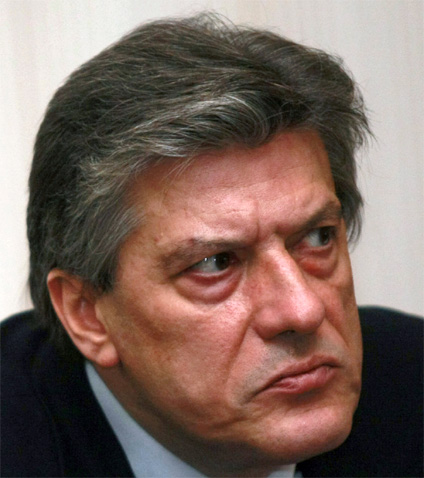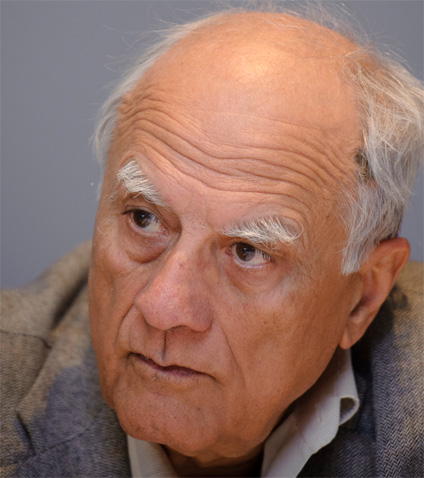The GERB party that won the largest number of the MP seats on October 5 is holding consultations this week with the other 7 political formations, which are to form the representation of the future parliament. As expected, on Monday the negotiations with the socialists ended with no agreement. It was not only because GERB had stated that a broad coalition with the socialists was impossible due to the huge poll result difference. That would mean an unstable government. It turned out after the negotiations that the lack of agreement on major priorities exceeded twice the matching views. The question marks before the forthcoming Bulgarian government are increasing in a threatening manner.
 Associate Prof. Antonyi Galabov from the Political Science Dept. of New Bulgarian University foresees in an interview for RB:
Associate Prof. Antonyi Galabov from the Political Science Dept. of New Bulgarian University foresees in an interview for RB:
“I see an expert government with clear program and terms as the best option for what’s to follow next. It should be submitted with the mandate of GERB and with a clear support from the parties at parliament. That is the formula that could help us avoid the risk from instant second early elections, answering at the same time the heavy questions, threatening the living standard of Bulgarian citizens over the next months. Unfortunately GERB has structured the negotiations on the forming of a government and not on the building of a sustainable parliamentary support for certain decisions. Above all we are talking here of the budget update, of the volume of the state debt necessary, in order for such an update to be provided. Next, a clear stance is needed on the situation concerning the Corporate Commercial Bank and the elimination of this huge risk for the bank system. Then, the next budget should be compiled and submitted at parliament by November 30. We have a clear agenda under which the negotiations should have taken place. Instead, we witness overall preliminary consultations for interfaces, on reforms that might take between 6 months and 6 years. I think this initial week will pass rather in consultation of stances. If these stances had been clearly defined in the campaign, we could have witnessed the reaching of an agreement now.”
The natural thing would be to form a cabinet with the participation of GERB, the Reformist Bloc (RB) and the Patriotic Front, claim both Associate Prof. Galabov and Prof. Petar-Emil Mitev, head of the Ivan Hadjiski Institute for Social Activities and Structures.
 “The Alternative for Bulgarian Revival might take part as well,” Professor Petar-Emil Mitev goes on to say. “I can’t exclude such an option, as the relations of GERB leader Boyko Borissov with ABR leader Georgi Parvanov /ex-president, 2002 – 2012/ differ, compared to the ones with former leader of the socialists Sergey Stanishev. The electorate of the new party would accept a cooperation of this kind, unlike the one of the socialists. Early elections are quite possible. There are no guarantees that no matter the format, the coalition will be stable.”
“The Alternative for Bulgarian Revival might take part as well,” Professor Petar-Emil Mitev goes on to say. “I can’t exclude such an option, as the relations of GERB leader Boyko Borissov with ABR leader Georgi Parvanov /ex-president, 2002 – 2012/ differ, compared to the ones with former leader of the socialists Sergey Stanishev. The electorate of the new party would accept a cooperation of this kind, unlike the one of the socialists. Early elections are quite possible. There are no guarantees that no matter the format, the coalition will be stable.”
Prof. Mitev says that agreement is necessary on the subjects mentioned, adding one more – the system of healthcare. “Boyko Borissov avoided the reform in that sector, as it requires untraditional measures. Now he can avoid it no more,” the professor points out.
One day before the consultations with the Movement for Rights and Freedoms, starting Tuesday, its leader Liutvi Mestan stated that his party would give up any participation in a government, but will support a single-party-cabinet of GERB, that is - a minority government. He warned on the danger of an impaired stability in case extreme nationalist formations enter the government, saying that this option is even worse than new early elections by the end of the year.
“This is not something new,” professor Mitev further comments. “Mestan declared the same before the elections. The MRF aims at complicity and GERB will depend on the Movement. This means Borissov won’t be able to knock down their people in the regions, nor their economic interests.”
“A stance of MRF, hours before the start of the consultations with GERB means a lot,” says Associate Prof. Galabov.
“So, we enter a decisive phase of these consultations,” he went on to say. “If the geometry of the negotiations is not changed, if it is not focused on a very short agenda, by the spring of next year, it might put in danger the common reaching of an agreement. As declared by them both, GERB and MRF do not want to rule together due to many reasons. The MRF cannot be the first coalitional partner, according to the GERB voters themselves. The situation is worsening. The alternative that the MRF pushes GERB to, besides a one-party minority government, is an attempt to look for a coordination and cooperation with the Bulgaria Without Censorship (BWC) coalition. This seems to be more comfortable for GERB, as far as it can pin down the tension, related to nationalism, but on the other hand it creates many other serious dilemmas in front of a future government of GERB, RB and BWC,” Associate Prof. Antonyi Galabov said in conclusion.
English version: Zhivko Stanchev
The support for the nomination of Atanas Atanasov for National Assembly Speaker is linked to support for Boyko Borissov as a candidate for prime minister , GERB MP Daniel Mitov said in an interview for the Bulgarian National Radio. "Everything can..
Pro-Russian candidate takes lead in first round of presidential election in Romania In a shock development, independent far-right, pro-Russia candidate Calin Georgescu took the lead in the first round of the presidential election in Romania with..
The members of Parliament are rather skeptical before yet another attempt to elect a National Assembly Speaker. The candidates for Speaker of the National Assembly are Raya Nazaryan from GERB-SDS, Natalia Kiselova from BSP-United Left, Petar Petrov..

+359 2 9336 661
